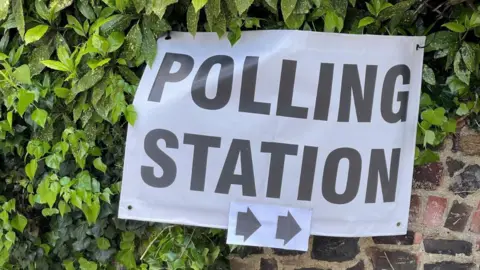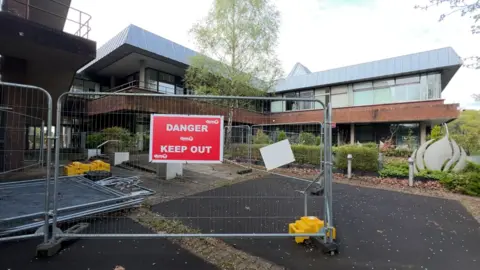The Tory stronghold facing an unpredictable election
 BBC
BBCIt's been 20 years since Worcestershire's county council wasn't run by the Conservatives but politicians have said nothing can be taken for granted in the upcoming local elections.
"I've absolutely no idea what's going to happen," one long-serving councillor tells me.
Normally a decent forecaster of which way the county's political winds are blowing, this time they are struggling to predict how the votes will fall on polling day.
Conservative-controlled since 2005, all 57 of Worcestershire's county council seats will be contested on 1 May.
At the local authority's last elections in 2021, the Conservatives won a decisive victory, securing 45 of those seats. No other party managed more than a handful.
But on a campaign visit to Worcestershire earlier this month, the party's leader Kemi Badenoch acknowledged the role the so-called "vaccine bounce" had played in that during the Covid-19 pandemic.
A lot has changed since then.
In the general election last July, the Conservative vote in Worcestershire more than halved when compared to the previous election in 2019.
The county now has two Labour MPs, one in Redditch and another in Worcester, while both the Greens and Liberal Democrats appear confident of making gains in local polls and of playing a role in any future administration.
And don't discount Reform. Four years ago the party fielded only seven candidates. This time it has mustered a full slate of 57.
Elected, but for how long?
Normally, county councillors are elected for four years.
But not this time.
This election is unusual because it is almost certain to be the last time we see elections to Worcestershire County Council before the government pushes ahead with its plan to streamline local authorities.
For 27 years, voters in Worcestershire have elected a county council to run services like roads, social care, public transport and libraries, as well as six district councils to run services like bins, parks and housing.
But now the Labour government wants those authorities merged and for a regional mayor to be elected.
On its current timeline, a new council system could be in place by April 2028.

Despite that outlook for the county council, this year's elections are still important because the politicians that voters pick here on 1 May will have a key role in shaping what comes next.
While the Conservatives want a single county-wide authority, Labour, the Greens and Liberal Democrats have all suggested splitting the county in two.
Dividing Lines
A former Royalist headquarters during in the English Civil War, Worcester's Commandery museum offers a view back of the city's turbulent history.
Ahead of polling day, it played host to BBC Hereford and Worcester's local election debate between the county's five main political parties.
As well as answering questions from voters, party spokespeople set out their key priorities.
"Conservatives have a strong track record of delivery across Worcestershire and a clear plan for the future," said Simon Geraghty, the Tory leader of the council since 2016.
His party's six-point plan includes a £64m investment in road and pavement maintenance over the next three years and a £173m investment plan for extra school places.
Meanwhile Labour candidate Beverley Nielsen said her party would prioritise growing the local economy, using the county council's procurement powers to help businesses thrive.
"We've had 20 years of Tory leadership and where has it left us: with a budget deficit, with £604m of debts and a government bailout," she said.
Reform candidate Max Windsor-Peplow said Worcestershire's services were "in crisis".
"We are standing on a manifesto pledge of auditing the council's finances immediately. We can't carry on like this."
If successful in securing a role on the council's administration, he said his party would carry out an immediate review into SEND [Special Educational Needs and Disabilities] provision to understand its failings.
Last April, a joint Ofsted and CQC inspection found there were "widespread failures" within SEND provision in Worcestershire with some children waiting two years for assessment.
The local authority is currently working on an action and improvement plan it was instructed to produce.
 PA Media
PA MediaLiberal Democrat candidate Mel Allcott hopes to attract voters by steering a middle course.
"We're not so far right that we're unreasonable… and we are not so far left that it just doesn't work for a lot of the population.
"We're here to listen," she said, highlighting adult social care, children's services and public transport as the party's main focus for change.
Matthew Jenkins is standing for the Greens and said his party "works hard all year round" and would introduce measures to tackle congestion and pollution.
"We get things done locally. We hold the council to account and we have fought against bus cuts and the crisis that is SEND at the moment."
More information on the election and how to make sure you are registered to vote is available on Worcestershire County Council's website.
Full lists of candidates in each of the county's six districts are also available.
Follow BBC Hereford & Worcester on BBC Sounds, Facebook, X, and Instagram.
